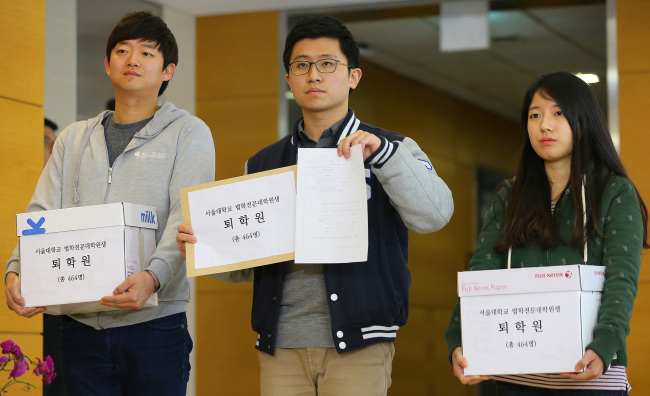The government’s decision to delay the abolishment of the state-run bar exam has stoked vehement opposition, as students from 24 of 25 law schools in Korea agreed Friday to hand in dropout letters and refused to attend classes.
The University of Seoul Law School, one institute which did not participate in the movement, held a general meeting later in the day to discuss the matter.
“The Justice Ministry broke its promise in 2007 to abolish the bar exam, which is a nearsighted decision that is against the principal of trust,” said Lee Cheol-hee, the head of a student association of Korean law schools. “The move nullified the efforts of thousands of students and their families, who trusted the (law school) system will be established, and of 25 law schools across the country.”
The University of Seoul Law School, one institute which did not participate in the movement, held a general meeting later in the day to discuss the matter.
“The Justice Ministry broke its promise in 2007 to abolish the bar exam, which is a nearsighted decision that is against the principal of trust,” said Lee Cheol-hee, the head of a student association of Korean law schools. “The move nullified the efforts of thousands of students and their families, who trusted the (law school) system will be established, and of 25 law schools across the country.”

As of Friday, 464 of 480 students from Seoul National University Law School have submitted the dropout documents to the dean’s office, while students from Ewha Womans University remain undecided on when to hand in the papers. After the respective administrations review their documents, a final decision on the dropouts will be made.
The move is in protest against the Justice Ministry’s announcement Thursday to maintain the state-run bar exam -- originally slated for removal in 2017 -- until 2021, citing public opinion polls that showed 85.4 percent of the respondents saying it was too early to scrap the exams.
The bar exam -- introduced in 1963 -- was set to be abolished during the previous Roh Moo-hyun administration, with the National Assembly passing an act to set up law schools in 2007. Officials cited academic elitism as a prevalent problem of the system, as the majority students who passed the exam were from a handful of top-notch education institutes.
But the public opinion has turned sour over the past few years in light of the hefty costs of attending law schools -- ranging from 10 to 30 million won ($ 8,650-$25,922) a year -- coupled with admission scandals involving lawmakers.
While the Justice Ministry vowed to find solutions that would minimize possible side effects of the system by 2021, it was met with a massive backlash from the law school students who accused it of breaking its pledge.
“The biggest problem is that the ministry went back on its words just to become the patron of a bunch of ‘wailers,’” said a student from SNU Law School who declined to be named. “We (the students) know that law schools have some issues that need to be addressed and improved. But the solution should come from within the institutes, not in retrograding to the old system of bar exams.”
Civic groups like the People’s Solidarity for Participatory Democracy have also denounced the government’s decision, saying that the ministry, not the law schools, is responsible for hindering the system from settling down.
The Korean Association of Law Schools -- of which 25 law school chiefs are members -- held a general meeting Friday and discussed measures against the government policy. This included possible boycott of setting questions for the state bar exam.
“A heated reaction from (law school) students is only natural as the decision broke coherence and stability of their policy,” one of the law school heads told local media.
The government’s attempt to find a middle ground has also failed to satisfy those seeking permanent continuation of the bar exams, namely the local lawyers’ group. The Korean Bar Association issued a statement Thursday condemning the ministry for “turning down the majority of Korean people hoping to retain the bar exam.”
Other relevant organizations such as the Supreme Court and the Education Ministry also showed discontent saying the Justice Ministry did not discuss the issue with them.
As the backlash surged, the Justice Ministry took a step back on Friday and said its decision was not final. But the latest statement appeared to have backfired when the KBA denounced the decision as “giving in to the pestering by law school students.”
By Yoon Min-sik (minsikyoon@heraldcorp.com)


![[AtoZ into Korean mind] Humor in Korea: Navigating the line between what's funny and not](http://res.heraldm.com/phpwas/restmb_idxmake.php?idx=644&simg=/content/image/2024/04/22/20240422050642_0.jpg&u=)


![[Herald Interview] Why Toss invited hackers to penetrate its system](http://res.heraldm.com/phpwas/restmb_idxmake.php?idx=644&simg=/content/image/2024/04/22/20240422050569_0.jpg&u=20240422150649)
![[Exclusive] Korean military set to ban iPhones over 'security' concerns](http://res.heraldm.com/phpwas/restmb_idxmake.php?idx=644&simg=/content/image/2024/04/23/20240423050599_0.jpg&u=20240423183955)
![[Graphic News] 77% of young Koreans still financially dependent](http://res.heraldm.com/phpwas/restmb_idxmake.php?idx=644&simg=/content/image/2024/04/22/20240422050762_0.gif&u=)






![[Exclusive] Korean military to ban iPhones over security issues](http://res.heraldm.com/phpwas/restmb_idxmake.php?idx=652&simg=/content/image/2024/04/23/20240423050599_0.jpg&u=20240423183955)



![[Today’s K-pop] Ateez confirms US tour details](http://res.heraldm.com/phpwas/restmb_idxmake.php?idx=642&simg=/content/image/2024/04/23/20240423050700_0.jpg&u=)